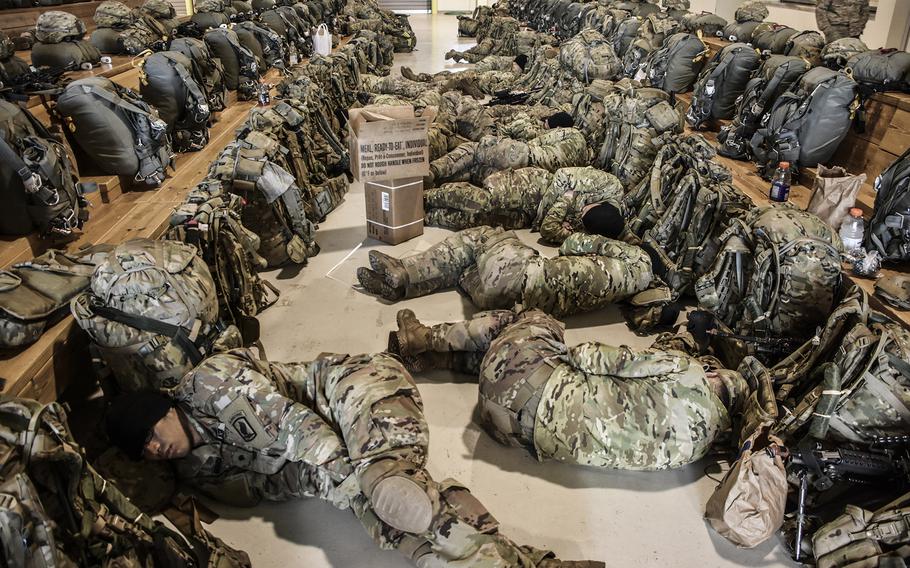
Paratroopers from the 173rd Airborne Brigade sleep on the floor after working through the evening prior to an early-morning combat equipment jump at Aviano, Italy, on March 17, 2018. (John Hall/U.S. Army)
The military’s approach to preventing fatigue is fragmented and requires greater oversight to prevent potentially fatal accidents and help sleep-deprived service members, a government watchdog agency said this week.
Dedicated leadership at the Pentagon and in each service is needed to oversee progress combatting the issue, the Government Accountability Office said in a report released Tuesday.
The GAO asked service members how sleep deprivation affected their work and several said that slower reaction times could have led to deaths, injuries and millions of dollars in property damage.
“Sometimes when I’m driving, I find myself falling asleep and I have to catch myself,” said one respondent, who added that they feared they might kill someone due to lack of sleep. Rotary wing pilots, drone operators and aviation maintainers also reported fatigue interfering with their decision making.
U.S. service members have long complained of high operational tempos and sleep deprivation. Only about a third reported receiving seven or eight hours of sleep per night, according to periodic defense health surveys conducted between 2005 and 2018, the GAO report said. The majority reported sleeping six or fewer hours.
The Defense Department recommends at least seven hours per night for optimal performance and readiness.
“DOD recognizes that impairment from fatigue can be equivalent to the effects of alcohol intoxication and significantly increases the risk of physical injury,” the GAO report said.
Fatigue was identified as a factor in the June 2, 2016, crash of a Blue Angels F/A-18 Hornet that killed Marine Corps Capt. Jeff Kuss at an airfield in Tennessee.
It was likewise identified by the National Transportation Safety Board as a contributing factor in the crash of the Navy destroyer USS John S. McCain on Aug. 21, 2017, which killed 10 sailors.
In response, Congress in 2022 ordered the GAO to undertake a “comprehensive review” of DOD efforts.
The report found that while there are many research projects across the services, the Pentagon hasn’t facilitated collaboration and lacks leadership in key areas.
The GAO recommended that the Pentagon create an office to act as a focal point for its fatigue-related efforts, and that the office should have the authority, staffing, resources and commitment to oversee service-level programs.
DOD also should set up time frames for follow-on actions, coordinate with stakeholders and identify those responsible for implementing the recommendations of past fatigue-related studies, the report said.
The GAO also recommended that service secretaries assign leadership to work with the newly formed DOD office.